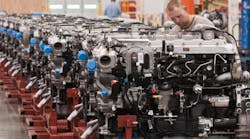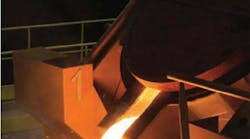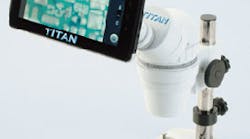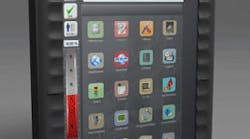December 1, 2006 — Cymat Technologies Ltd., a Toronto company that has developed a material called “stabilized aluminum foam,” has licensed its process technology to Georg Fischer Automotive to develop and manufacture automotive components. GF gains exclusive global rights to Cymat's proprietary low-pressure foam casting technology, on a “component-by-component” basis.
Stabilized aluminum foam is manufactured by bubbling gas through molten alloyed aluminum containing a dispersion of fine ceramic particles. It can be produced as either near-net shapes or flat panels that display good stiffness-to-weight ratio, mechanical energy absorption at low stress levels, thermal and acoustic insulation, recyclability, and relatively low cost of production.
GF Automotive operates 12 plants in Austria, China, and Germany, that produce stress-resistant iron, aluminum, and magnesium castings and diecastings for automakers and their suppliers.
The agreement follows a two-year development program by Cymat and GF over which time Cymat's low-pressure foam casting technology was industrialized and used to serve GF customers in large-volume applications. "We are pleased to evolve our two-year partnership from a development phase to a full licensing agreement," said Beat Ruckstuhl, v.p. - Research and Development of GF. "We hope the strong interest we are receiving from our customers for various aluminum foam components based on Cymat's LPFC technology will translate into commercial production in the near future."
The value and length of the licensing agreement has not been detailed, but Cymat describes it as “meaningful royalty payments.”
“These royalty payments commence in the development phase of the component and end with completion of platform production,” the company stated.
Preliminary development work is underway by GF on various automotive components using the LPFC aluminum foam technology, and Cymat states it expect that many of these will become royalty generating programs in the near future.
According to Cymat executive chairman Michael Liik, "This unique agreement addresses Cymat's requirement to generate early automotive revenues in an industry that is traditionally characterized by long lead times to production. In addition, this agreement provides Cymat with the flexibility to license other component producers and automotive manufacturers in different markets and provides an excellent template for this expansion.”
Cymat CEO Chris Skillen stated: "This development is consistent with Cymat's new strategy to migrate from a research focused company to one that has early and growing revenues in the automotive sector. Georg Fischer is an excellent partner on many fronts and their endorsement of Cymat's LPFC technology bodes well for our company."



